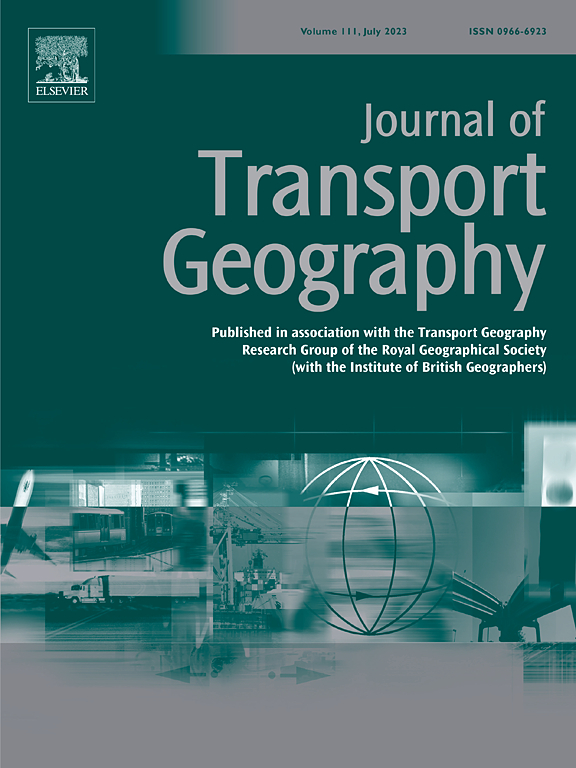Measuring dynamic accessibility by metro system under travel time uncertainty based on smart card data
IF 6.3
2区 工程技术
Q1 ECONOMICS
引用次数: 0
Abstract
Measuring dynamic accessibility in the metro system is important for improving operations and for allowing passengers to plan their trips in advance under different circumstances. Yet, due to the large amount of data required, most accessibility studies do not consider the impacts of travel time uncertainty and individual preferences. In metro systems, smart cards record accurate travel information of each passenger. Based on detailed smart card data, this study proposes a framework for measuring dynamic accessibility by the metro system under travel time uncertainty and individual differences. First, dynamic reliable space-time prisms, which consider the impacts of travel time budget, time-varied travel time uncertainty and dynamic individual risk attitude, are used to generate dynamic feasible destination sets. Then, a dynamic destination choice model is built based on the discrete choice model considering the dynamic attractiveness of metro stations and time-varied travel time uncertainty. Finally, this study integrates the two sub-models to measure dynamic accessibility. The dynamic accessibility measure provides a more comprehensive framework for understanding travel behavior by capturing both objective spatial-temporal constraints and individual differences in the dynamic metro environment. The methodology is calibrated and evaluated in the Guangzhou Metro system, where the smart card data is available. The results show that accessibility differs significantly over different time periods. Notably, passengers at late hours are more risk averse to travel time uncertainty. Without considering the dynamic travel time, accessibility will be over-estimated during peak hours on urban lines and during non-peak hours on suburban lines. Moreover, variations of dynamic accessibility of terminal stations in suburban lines are higher.
基于智能卡数据的出行时间不确定性下地铁系统动态可达性测度
测量地铁系统的动态可达性对于改善运营和允许乘客在不同情况下提前计划行程非常重要。然而,由于需要大量的数据,大多数可达性研究没有考虑出行时间不确定性和个人偏好的影响。在地铁系统中,智能卡记录了每位乘客的准确出行信息。基于详细的智能卡数据,本研究提出了出行时间不确定性和个体差异下地铁系统动态可达性度量框架。首先,利用考虑旅行时间预算、时变旅行时间不确定性和动态个体风险态度影响的动态可靠时空棱镜,生成动态可行目的地集;然后,在考虑地铁车站动态吸引力和时变出行时间不确定性的离散选择模型的基础上,建立了动态目的地选择模型。最后,本文将两个子模型结合起来进行动态可达性测度。动态可达性指标通过捕捉动态地铁环境中的客观时空约束和个体差异,为理解出行行为提供了一个更全面的框架。该方法在广州地铁系统中进行了校准和评估,其中智能卡数据可用。结果表明,可达性在不同时期存在显著差异。值得注意的是,深夜的乘客对旅行时间的不确定性更加厌恶风险。在不考虑动态出行时间的情况下,城市线路高峰时段和郊区线路非高峰时段的可达性将被高估。此外,城郊线路终点站动态可达性变化较大。
本文章由计算机程序翻译,如有差异,请以英文原文为准。
求助全文
约1分钟内获得全文
求助全文
来源期刊

Journal of Transport Geography
Multiple-
CiteScore
11.50
自引率
11.50%
发文量
197
期刊介绍:
A major resurgence has occurred in transport geography in the wake of political and policy changes, huge transport infrastructure projects and responses to urban traffic congestion. The Journal of Transport Geography provides a central focus for developments in this rapidly expanding sub-discipline.
 求助内容:
求助内容: 应助结果提醒方式:
应助结果提醒方式:


